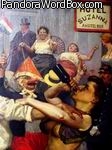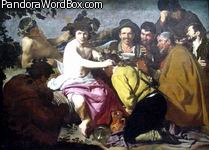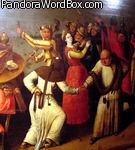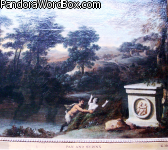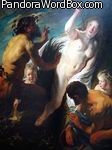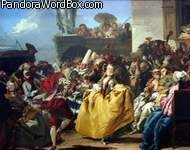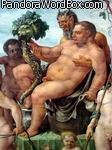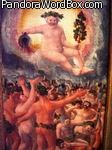Our websites offer information mostly for educational purposes with no intent to alter health care protocols nor to serve as a sole source of medical information.
Always seek the advice of your local health care provider.
|
× UKRAINIAN CHILDREN WITH DISABILITIES HAVE SPECIAL NEEDS |
CARNIVAL CARNAVAL
Mardi Gras Dionysia Bacchanalia Lupercalia
(Part 2)
Some of the notions (ideas) conveyed by the worlds below. Please also visit numerous companion and related pages, webinars, other pges (see above on the left), images, carousels, and videos.
CARNa as in Carnal Flesh
VALe Leave Levitate
MAR Mars Martial
DI Divine Diva
DIEM Day Deity
GRAS Greasy Unctuous
LUPERCALIA Feast Luper was Dionysus
LUPUS Disease Devouring tissues
LUPUS Disease Devouring tissues
LUPA She-wolf Often euphemism for prostitute
BACCHANALIA Greek feast Festivity to honor Bachus
(Expanded notions from Part 1) - Saint Valentine is a companion overiew - note link on the top of the left column which also includes links to other overviews and "word-ideas" exposing ancient notions of "spring" and "love celebrations" - syncretically, these are feasts of the "rebirth of life" in buds and blooms mixed with bird songs. The main ancient celebrations were known as "Dionysia" or "Lupercalia". What Christianity could not erase, it shaped into Saint Valentines Day but nonetheless, the rest of the pagan festivities survive as our current Carnivorous Carnal Carnival which ends in Mardi Gras and is followed by Lent.
Modern Carnival or Mardi Gras is a melange, mezcla or mix of world-old legends that endure because they can INFlame and INFect the imagination. In this sense, Carnival is of interest because it provides an anesthetic from reason; perhaps, this is the reason why Sigmund Freud was so much nterested in mythology. It is a fact that Carnival offers an escape or liCENSE for people to act "foolishly" and even to liCENTiously "fool around". In any case, for the ancients, Dionysia was in honor of Dionysus who stood for "the nature of natural man".
Carnival, when celebrated by modern BACCHANTS, often ends in a BACCHanalia - such an ending may delight of some BACCHIC BACHelors and BACHelorettes. Perhaps LAUREates should realize that BACCA, the fruit of the LAUREL tree, relates to LUPERcalia or Carnival. It is noted that Apollo or LUKHeious (from LUPA or wolf slayer) was the emblem of masculine perfection, a fact that did not prevent Daphne from rejecting his love. Undeterred and in her honor, Apollo declared that the LAUREL tree and its fruit or BACCA was to be the emblem to grace the crowns of BACCA-LAUREATES. Those who earn a Batchelor degree should realize the need to pledge to love knowledge as much as Apollo loved Daphne.
DIONYSIA was also known as OMOPHAGIA which underscores a less poetic facet of such celebrations. At times, celebrants engaged in tearing animals and eating their raw flesh. OMOPHAGIA became rooted in ancient Zoroastrian and Orphic rituals and represented a quest for immortality. Its evolution into rituals of tearing bread mixed with wine as an emblem of flesh and blood survive in the tradition of the Eucharist of Christians.
LUPERCALIA may also derive from LUPERCUS, another name for PAN. As LUPERCUS, PAN was worshiped as the protector of flocks from LUPINE attacks. PAN also stood for someone who was to please ALL Olympic Gods. The PAN-THEO-nic PAN-orama associated with PAN also includes his desire to engender human PAN-acea. In any case, when we wish for all our desires to materialize, we hope our wishes will "PAN out".
PAN had a particular VENERation for VENUS and both are fostered during CARNival by CARNal pursuits which may end in flesh tearing VENEReal diseases. Such risks are greater if CARNIVALs CARNAL pleasures stem from a voLUPTuos LUPA working in a LUPAnar (house of prostitution). LUPUS erythematosus is another flesh tearing disease but it is not of VENEReal nature. Patients with LUPUS should not PANic but rely on modern medical regimes including those that protect their PANcreas.
Near the temple to Dionysus or BACCHUS, the Athenians held dramatic contests called Greater Dionysia as depicted on the frieze of the Pantheon - the PANathenaea or a procession honoring Dionysus. In 405 B.C., Euripides won the first prize for his trilogy of plays including one called BACCHAE, considered to be one of the greatest dramas ever written. The drama is about Agave, a name that now points to hallucinigenic agents found in Pulque or Century Plants. In this play, Agave, in an orgiastic fury, dismembered her son Pentheus. After regaining her senses, the enormity of her crime led Agave to insanity and suicide, a fate shared by many modern abusers of hallucinogenic drugs. This drama starts with the return of Dionysus after a long absence in India. To his disappointment, he noted that most Greeks did not remember that he was the son of Zeus and therefore a DIVO or DIVInity. The only worshipers of his were women we call BACCAE or MAENeads. These women resorted to hallucinogens to induce ecstasy and engaged in ORGIAstic and FRENetic MANIC MADdening devotions as the result of their MEANdering minds. In revenge for his neglect by the Greeks, Dionysus chose to intoxicate an unbeliever and chose Agave, the mother Queen of Thebes, a daughter of HARMonia - she was to HARM her own son and her own mind.
In New Orleans and "French" Louisiana, the French penchant for good food and joyful living added to CARNival and emphasis on MARDI GRAS or "FAT" TUESDAY, a time for culinary deBAUCHEry. In fact, deBAUCHEry points to mouth as in BOUCHE, BUCCA, BOCA and to BOCADO or morsel in Spanish.
MARDI GRAS is followed by LENT or 40 days that pass with LENTitude, in part because believers must abstain from consuming CARNes or flesh and some even avoid other sorts of CARNal pleasures.
Euripides, 2400 years before Freud understood that CARNal desires not only can tear our flesh but also our mind. Young people are immature ORGanisms and even if capable of reaching an ORGasm may not be ready to contend with love. True love relies on a healthy and mature Psyche.
ORGiastic ORGies cause disORGanized imPULSEs as represented by BACCHAnalia and CARNIval. Young people should pay heed to the story by Apuleius stressing that Cupid could only be LIBerated and LIBido for CARNal pleasures by his true and corresponded love for Pshyche.
The price Adam and Eve paid for "eating" or assimilating knowledge was to become "framed" between wild desire and aggressive warfare. (Altdorfer)
20110219 ww






